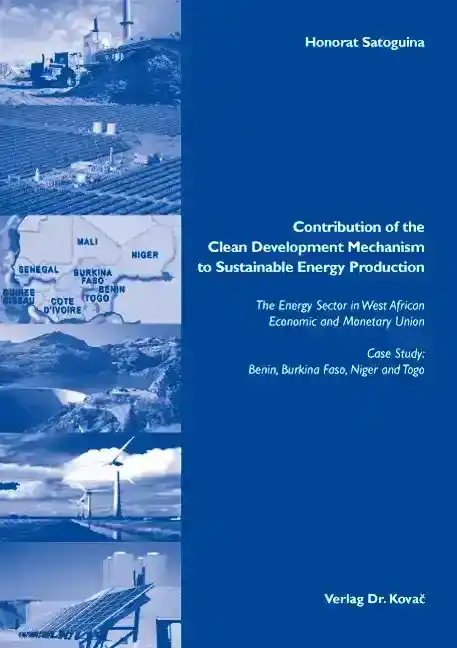Honorat SatoguinaContribution of the Clean Development Mechanism to Sustainable Energy Production
The Energy Sector in the West African Economic and Monetary Union - Case Study: Benin, Burkina Faso, Niger and Togo
Wirtschaftspolitik in Forschung und Praxis, Band 34
Hamburg 2007, 352 Seiten
ISBN 978-3-8300-2924-3 (Print)
ISBN 978-3-339-02924-9 (eBook)
Zum Inhalt
The Kyoto Protocol encompasses flexible mechanisms, which allow the use of the world’s cheapest possibilities for emission reductions. The Clean Development Mechanism (CDM), which allows for the generation of emissions credits through emission reduction projects, is the only mechanism that involves developing countries in the global climate change mitigation efforts. Its aim is to contribute to sustainable development (SD) in the host countries.
This study assesses the contribution of the CDM to SD in energy sectors in the West African Economic and Monetary Union (WAEMU), concentrating on Benin, Burkina Faso, Niger and Togo. It assesses the CDM attractiveness of these countries and compares them to Morocco, which is the second best CDM destination in Africa. The assessment finds that the economic CDM potential of the countries is low, and the overall CDM investment climate poor. The studied countries’ lack of competitiveness is also due to the fact that baselines for electricity generation are not attractive.
Through a cross-sectional survey of different stakeholder groups in the countries, the prospective sustainable development criteria for the CDM are examined. Furthermore, prospective small-scale CDM projects in renewable energy and energy efficiency sectors are analysed, showing a positive contribution to SD.
As the CDM is a market mechanism, currently, CDM capacity development is not directed to least developing countries (LDCs), where the low CDM potential is a challenge. However, it is possible to raise funds to support CDM activities in LDCs. To overcome this challenge, several LDCs as a group should raise these funds together. Hence, this study analyses how the West African Economic and Monetary Union (WAEMU) could be used as a vehicle to attract CDM financing. In this context, it analyses possibilities for bundling CDM institutions and suggests a regional CDM approval body (RAB) entrusted to the WAEMU commission. The RAB is a cost-efficient institution-building option, which could give CDM projects in those countries with low CDM attractiveness a chance. However, a public choice analysis finds that the RAB is only an economically efficient option, in contrast to national DNAs, which are a politically efficient option.
